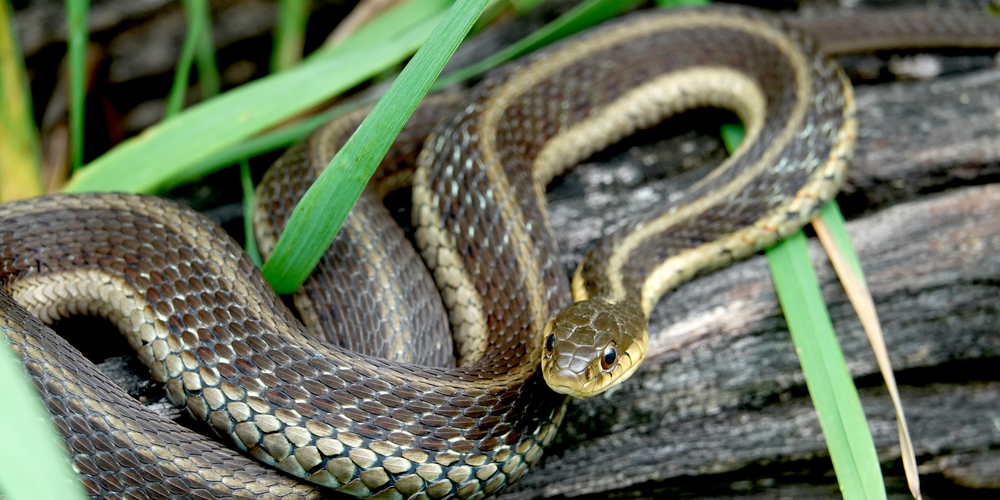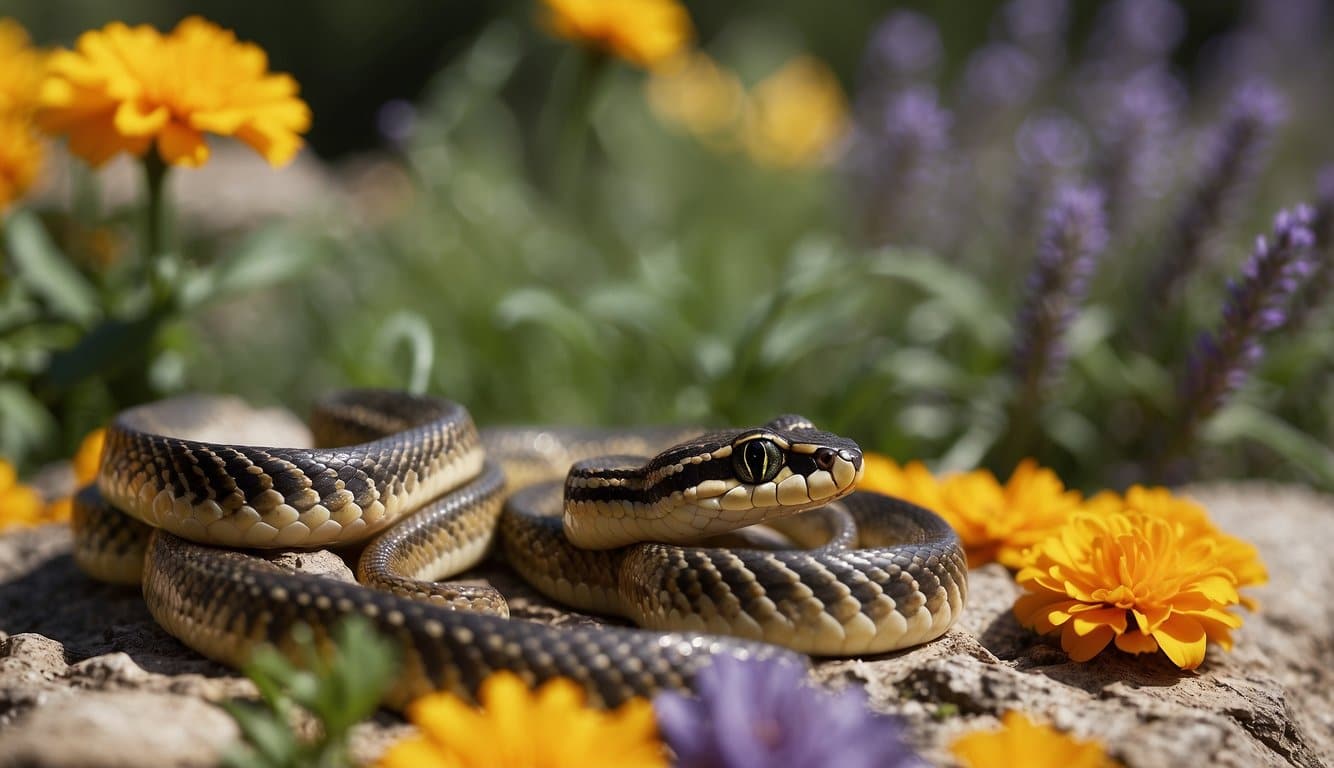Is a Snake Free Yard a Good Idea?
Snakes are cold-blooded reptiles that regulate their body temperature externally. Your yard can provide both warmth from the sun and shaded areas which snakes might use for thermoregulation.
Here’s what you need to know about their habits:
- Active Periods: Most snakes are active during the day, particularly in the cooler hours of the morning and late afternoon.
During peak heat, they often seek shaded or underground places where they feel safe.
- Hiding Spots: Snakes favor hiding spots such as piles of leaves, high grass, and stacks of wood.
Keeping these areas clean reduces potential hiding places for snakes.
- Water Sources: Like any other animal, snakes need water, and your garden can be an attractive source.
Regular maintenance can help avoid creating inadvertent watering holes for them.
- Feeding Habits: They are often drawn to places where food is plentiful.
Rodents are a primary food source, so eliminating any rodent problems can make your yard less enticing.
Remember that snakes are more afraid of you than you are of them.
Creating a habitat that’s inhospitable for them can effectively discourage their presence:
- Trimming Grass: By regularly mowing your lawn and trimming bushes, you limit the areas where snakes can comfortably settle.
- Yard Maintenance: Clearing away debris, filling in gaps under rocks, and keeping woodpiles neat and off the ground are key steps in reducing snake attractiveness.
- Avoiding Clutter: Minimal clutter means minimal hiding spots.
Prioritize a tidy yard to reduce the appeal for these reptiles.
Awareness of snake behavior is crucial for maintaining a yard less attractive to them.
By understanding their ecological needs, you can tailor your landscaping to discourage them from considering your yard a suitable habitat.
Physical Barriers for Snake Prevention
To protect your yard from unwanted slithery visitors, installing physical barriers is one of the most effective strategies.
Fencing can provide a permanent solution that’s both unobtrusive and highly successful at keeping snakes at bay.
Types of Fencing to Deter Snakes
Before you choose a fence, it’s crucial that you consider the type of snake you’re trying to exclude. Here are some specific fencing options:
- Solid Wood Fencing: This provides a solid barrier that snakes cannot breach. The fence should be at least 36 inches high with the bottom buried several inches in the ground.
- Steel Mesh Fencing: Steel mesh with a fine weave can prevent snakes from entering your yard.Ensure the mesh size is small enough to keep out even the most persistent of serpents.
Using Snake-Proof Mesh
Snake-proof mesh is a specific type of barrier that you can add to an existing fence for extra protection, or use to create a dedicated snake fence. Here’s how to effectively use snake-proof mesh:
- Choose a galvanized hardware cloth with a weave no larger than 1/4 inch to ensure snakes can’t pass through.
- Install the cloth tightly against the ground and bend the bottom outward in an “L”-shape, burying it to form a barrier that snakes cannot dig under.
By following these specific steps, your yard can be a no-go zone for snakes, giving you peace of mind and a safer outdoor space.
Natural Snake Repellents
In your quest to enjoy a snake-free yard, there are natural and environmentally friendly options you can deploy. These methods can discourage snakes from taking up residence in your outdoor spaces without the use of harsh chemicals.
Plant-Based Deterrents
Certain plants act as natural snake deterrents due to their strong smells or physical structure:
- Marigolds: These bright flowers emit a scent that can deter snakes.
- Mother-in-law’s tongue: Also known as snake plants, their sharp leaves may prevent snakes from entering the area.
Essential Oils as Snake Repellents
Essential oils are potent and can repel snakes when used in your garden:
- Cinnamon oil and clove oil: Mix together and spray around your yard’s perimeter. View Recipe
- Garlic oil: Create a barrier by applying garlic-infused oil, a scent snakes find unpleasant. Learn More
Employing these natural strategies can help keep your outdoor areas less inviting to snakes.
Maintaining a Snake-Hostile Environment
To effectively keep snakes at bay, it’s essential to make your yard uninviting to these reptiles through meticulous garden and water feature management.
Garden Maintenance to Prevent Snakes
- Regular Lawn Care: Keep your grass mowed to a short length. Tall grass provides cover for snakes.
- Debris Management: Clear piles of leaves, rocks, and wood where snakes might hide.
- Example: Ensure areas under sheds and outbuildings are clear of debris.
- Plant Choices: Cultivate plants that are known to repel snakes, such as marigolds and lemongrass.
Water Feature Management
- Pond Perimeters: Keep the edges of any water features trimmed and free from overgrowth.
- Water Circulation: Use a pump to maintain water movement, as snakes prefer still water for drinking.
- Fish Populations: Stock water features with fish that may deter snakes from considering your pond as habitat.
Professional Snake Control
When it comes to keeping your yard snake-free, sometimes the best course of action is to call in the professionals. Here are the steps and services typically involved in professional snake control:
- Assessment:
- A professional will survey your yard to identify potential snake habitats.
- They will determine the species of snakes present and the level of infestation.
- Removal:
- Trained experts safely remove any snakes found on the property.
- They use humane traps and relocation strategies.
- Exclusion:
- Sealing entry points to prevent snakes from entering homes or outbuildings.
- Installing fences designed specifically to keep snakes out of the yard.
- Habitat Modification:
- Clear Debris: Removal of snake shelters like rock piles, wood stacks, and dense brush.
- Trim Greenery: Keeping grass short and shrubbery well-trimmed reduces hiding spots.
- Prevention Tips:
- They may offer advice on preventing re-infestation, such as:
-
- Removing food sources like rodents.
- Using snake repellent products that have shown to be effective.
- Follow-Up:
- Routine property checks to ensure that the snake prevention measures remain effective.
- Adjustments to strategies as needed based on ongoing monitoring.
Frequently Asked Questions
When considering how to maintain a snake-free garden, exploring natural and safe practices is crucial to ensure the wellbeing of your family and pets.
What natural methods deter snakes from entering home gardens?
- Introduce natural predators, like guinea fowl, that feed on snakes.
- Utilize sharp mulch, such as hawthorn leaves or rose branches, which can discourage snakes from slithering through.
Are there any pet-safe strategies to prevent snakes in my yard?
- Maintain a tidy yard by removing debris and sealing any small gaps around your home to limit snake access.
- Consider using a pet-safe snake repellent such as products made from natural essential oils.
Which plants are known to repel snakes from outdoor areas?
- Marigolds emit a smell that can deter snakes.
- Lemongrass contains citronella, which is another natural snake repellent.
Could certain smells help in keeping snakes away from residential properties?
- Garlic and onions produce sulfonic acid, which can be unpleasant to snakes.
- Ammonia-soaked rags placed around the garden may help, but should be used cautiously as they can be harmful to other animals and plants.
How can homeowners create a snake-repellent environment through DIY methods?
- Regularly mowing your lawn and keeping it short can reduce hiding spots for snakes.
- Filling in rodent holes or burrows with gravel or dirt can discourage snakes from taking residence.
What are effective landscaping tips for minimizing snake habitats in backyards?
- Limit water sources like ponds and birdbaths that might attract snakes seeking prey.
- Keep woodpiles and compost heaps far from your house as they can offer shelter and food to rodents, which in turn attract snakes.
Last update on 2025-04-20 / Affiliate links / Images from Amazon Product Advertising API




